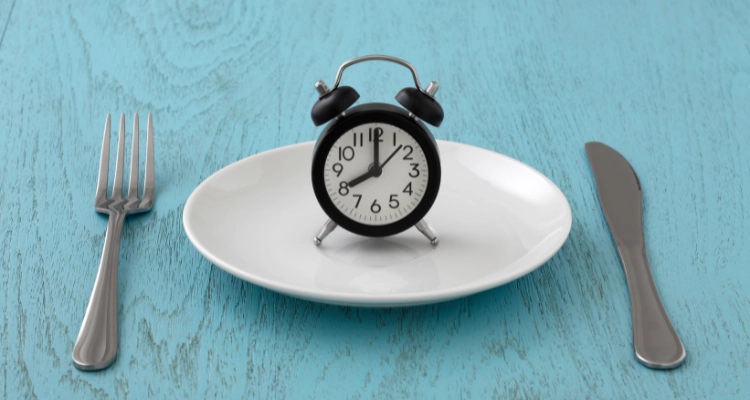For many women, managing these changes can be daunting. However, a growing number of women are finding relief and improving their overall well-being through intermittent fasting for women over 50 in menopause.
This approach is gaining popularity because it can help balance hormones, reduce weight, boost energy, and ease the symptoms associated with menopause.
In this article, we will explore how intermittent fasting for women over 50 in menopause in 2025 can help you regain control over your health.
We will discuss the benefits, share tips on how to implement this strategy safely, and help you make intermittent fasting part of your daily routine.
What is Intermittent Fasting?
Definition of Intermittent Fasting
Intermittent fasting for women over 50 in menopause is a dietary strategy that alternates between periods of fasting and eating.
Unlike typical diets, intermittent fasting focuses on when to eat rather than what to eat.
Popular methods include the 16:8 method (fast for 16 hours and eat within an 8-hour window), and the 5:2 method (eat normally for five days and restrict calories for two days).
Why Intermittent Fasting is Beneficial for Women Over 50 in Menopause
As women approach and experience menopause, hormonal changes significantly impact metabolism, which can lead to weight gain, especially around the belly area.Intermittent fasting for women over 50 in menopause helps regulate insulin levels, improve metabolism, and support hormonal balance, making it an effective tool for managing weight and improving overall health during this stage of life.
How Menopause Affects Metabolism and How Intermittent Fasting Can Help

Hormonal Changes and Weight Gain
During menopause, decreasing levels of estrogen can cause an increase in fat storage, particularly around the abdomen. This can make weight loss more challenging.
Intermittent fasting for women over 50 in menopause can help by reducing calorie intake in a sustainable way and promoting fat burning during fasting periods.
Intermittent Fasting’s Role in Weight Control
Intermittent fasting for women over 50 in menopause encourages the body to tap into stored fat as fuel, rather than relying on constantly eating.This natural fat-burning process can help combat the slower metabolism that often accompanies menopause, allowing women to lose weight more effectively.
The Science Behind Menopause and Weight Gain
Menopause triggers several metabolic shifts, including the decline of estrogen and changes in insulin sensitivity.
These changes make it harder for women to burn fat, especially in the abdominal region.
Intermittent fasting has been shown to help combat these issues by balancing insulin levels and encouraging fat-burning during fasting windows.
How Intermittent Fasting Affects Estrogen and Insulin Levels
Estrogen plays a crucial role in regulating metabolism. As levels of estrogen drop during menopause, the body tends to store more fat.Intermittent fasting for women over 50 in menopause helps regulate insulin levels, which can counteract the negative effects of hormonal imbalance.
Additionally, fasting supports the natural production of estrogen, which can mitigate some of the symptoms associated with low estrogen during menopause.
Best Intermittent Fasting Methods for Women in Menopause

| Method | Duration | Benefits |
| 16:8 | 16h fasting / 8h eating window | Ideal for beginners. |
| 14:10 | 14h fasting / 10h eating window | Gentler, easy to adapt. |
| 5:2 | 5 regular days / 2 fasting days | Flexible and alternating. |
| Alternate-Day Fasting | 24h fasting every other day | Faster results, best for experienced users. |
Key Benefits of Intermittent Fasting for Women Over 50 in Menopause

Increased Energy and Focus
Many women in menopause experience fatigue and brain fog.By stabilizing blood sugar and improving insulin sensitivity, intermittent fasting for women over 50 in menopause has been shown to boost energy levels and enhance mental clarity, making it easier to stay active and focused throughout the day.
Improved Sleep and Mood Regulation
Hormonal fluctuations during menopause can lead to sleep disturbances and mood swings.
Intermittent fasting for women over 50 in menopause helps regulate cortisol and insulin, two hormones that affect sleep.
Many women report better sleep quality and improved mood once they incorporate fasting into their routine, especially when coupled with a consistent bedtime routine that prepares the body and mind for restful sleep.
Mental Health Benefits of Intermittent Fasting During Menopause
Mental health is another area where intermittent fasting can have positive effects.Fasting helps to stabilize cortisol levels, reducing feelings of stress and anxiety, which are common during menopause.
Studies have also shown that fasting increases the production of brain-derived neurotrophic factor (BDNF), promoting mental clarity and reducing the mental fog many women experience during menopause.
How to Start Intermittent Fasting Safely

The 14:10 Method – A Gentler Approach
If you’re new to intermittent fasting for women over 50 in menopause, it’s recommended to start with a gentler method like the 14:10 approach, where you fast for 14 hours and eat within a 10-hour window.
This method is easier to adjust to and provides a gradual transition to fasting.
Listening to Your Body and Seeking Medical Advice
Before starting intermittent fasting for women over 50 in menopause, it’s essential to consult your doctor, especially if you have pre-existing health conditions like diabetes, high blood pressure, or thyroid issues.
It’s important to listen to your body and adjust your fasting plan based on how you feel.
Nutrition Considerations for Intermittent Fasting
Nutrients That Support Menopausal Health
When practicing intermittent fasting for women over 50 in menopause, it’s essential to focus on foods that support hormonal balance.
Include plenty of protein to preserve muscle mass, healthy fats (like omega-3 fatty acids) for hormonal support, and phytoestrogens from foods like soy and flaxseeds to help manage hormonal fluctuations.
Staying Hydrated
Staying hydrated is essential—not just for comfort, but because water plays a critical role in supporting your body during fasting.
It helps regulate appetite, boosts metabolism, and ensures your system runs smoothly during fasting windows.
When to Consult a Doctor About Intermittent Fasting

Recognizing Red Flags
Although intermittent fasting for women over 50 in menopause is generally safe for most, it’s important to monitor your health.
If you experience significant fatigue, dizziness, or other concerning symptoms, it’s vital to consult with a healthcare professional.
Women with health conditions like diabetes should always check with a doctor before starting any fasting regimen.
Final Thoughts: Embrace Your Wellness Journey

It’s not about drastic changes or quick fixes—it’s about building sustainable, empowering habits that support your body and mind through menopause.
Start gently, listen to your body, and give yourself permission to adjust as needed.
With the right approach, intermittent fasting can become a powerful ally in your journey toward better health, balance, and vitality.
Have questions about intermittent fasting for women over 50 in menopause? Drop them in the comments below—I’d love to hear from you! And if this article helped you, don’t keep it to yourself—share it with a friend who might benefit too.✨ Your journey matters. Your health matters. And you’re not alone.







